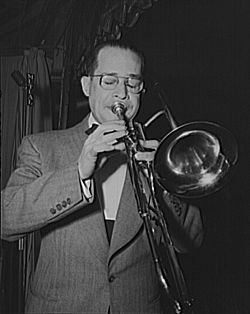| "Perdido" | |
|---|---|
 Juan Tizol in 1943 | |
| Song | |
| Written | 1941 (music), 1944 (lyrics) |
| Composer | Juan Tizol |
| Lyricists | Ervin Drake, Hans Lengsfelder |
"Perdido" is a jazz standard composed by Juan Tizol, a longtime member of Duke Ellington's orchestra. It was first recorded for radio transcription on December 3, 1941, by Duke Ellington. The Duke Ellington Orchestra recorded it again, this time for Victor, on January 21, 1942. [1] In 1944, Ervin Drake and Hans Lengsfelder were hired to write lyrics for the song.